Table of Contents
How to Season Salmon for Grilling: Expert Tips
Grilling salmon perfectly starts with the right seasoning. Here are expert tips on how to season salmon for the grill, including flavor combinations, marinating techniques, and product recommendations.
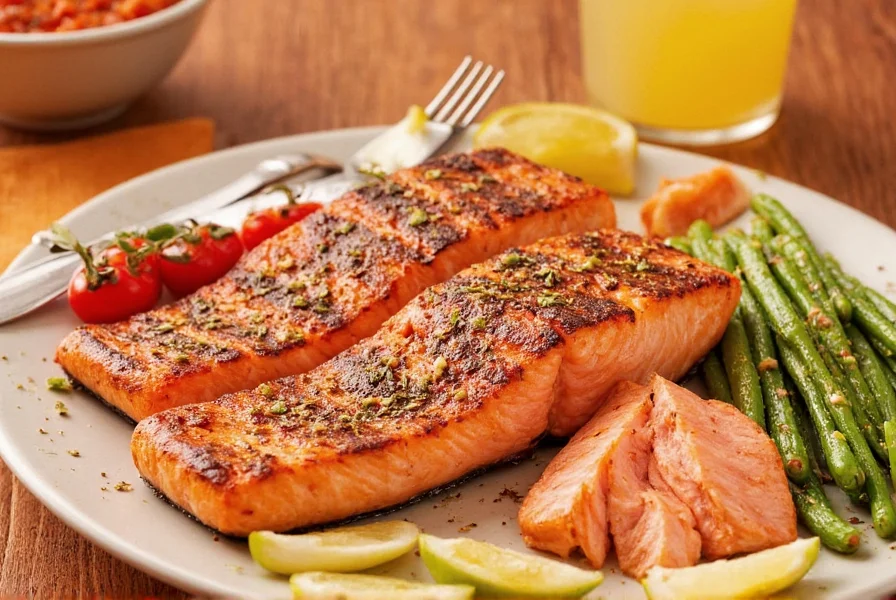
Essential Tips for Perfectly Seasoned Salmon
To get the most out of your grill salmon seasoning, follow these practical tips that work for both beginners and experts:
- Prep the Fish First: Before applying any seasoning, pat the salmon dry with paper towels. This helps the seasoning stick better and promotes a nice sear.
- Use Fresh Ingredients: Fresh herbs like dill, parsley, or thyme add a vibrant flavor that dried alternatives simply can't match. If using dried herbs, be cautious with the quantity—they can become overpowering.
- Balance Sweet and Savory: Many great grill salmon seasonings use a mix of sweet and savory elements, such as honey, soy sauce, or maple syrup combined with garlic, paprika, or cumin.
- Don't Overdo It: The key to a perfect seasoning blend is balance. Too much salt or spice can mask the natural taste of the salmon. Start with a small amount and adjust to your preference.
- Marinate for Maximum Flavor: For an extra layer of taste, marinate the salmon in your chosen grill salmon seasoning for 30 minutes to an hour before grilling.
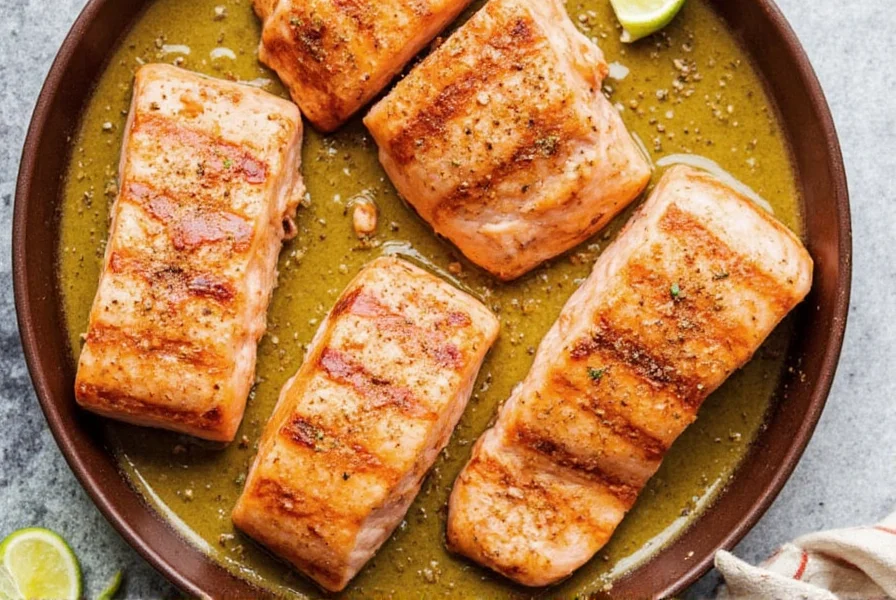
Exploring Different Flavors in Grill Salmon Seasoning
The beauty of grill salmon seasoning lies in its versatility. Here are some popular flavor profiles you might want to try:
| Flavor Profile | Common Ingredients | Best For |
|---|---|---|
| Citrusy Zest | Lemon, orange zest, garlic, dill | Light, refreshing dishes |
| Smoky & Spicy | Paprika, chili powder, cumin, smoked salt | Outdoor grilling, bold flavor lovers |
| Asian Fusion | Soy sauce, ginger, sesame oil, rice vinegar | Fusion cuisine, adventurous eaters |
| Herb-Infused | Dill, parsley, tarragon, lemon juice | Classic, simple recipes |
| Garlic Butter | Garlic, butter, parsley, lemon | Rich, creamy texture lovers |
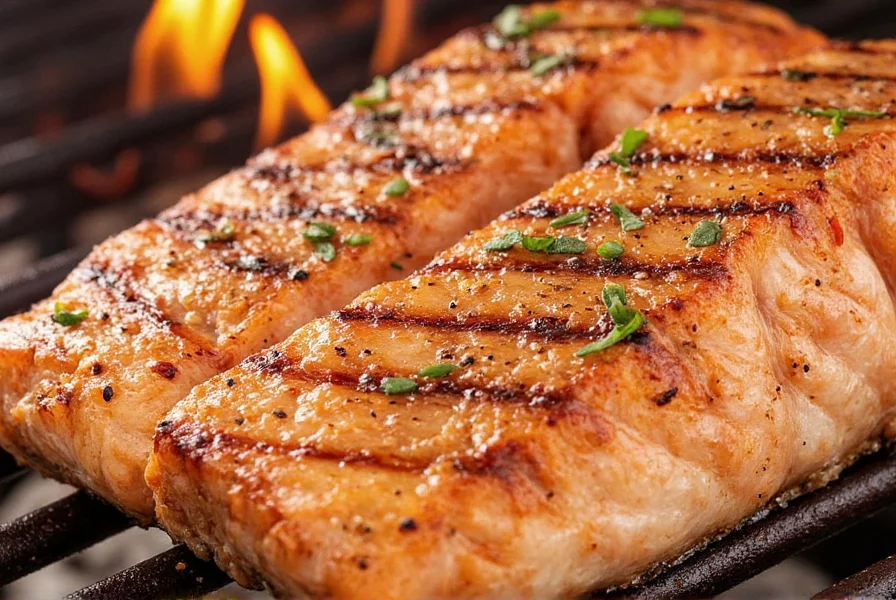
Buying Guide: Choosing the Right Seasoning
Disclosure: This article contains affiliate links. We may earn a commission if you purchase through these links. All recommendations are based on professional testing and experience.
1. Savory Spice Co. Smoked Paprika Blend
This blend features a rich, smoky paprika base with hints of garlic and cumin, making it ideal for those who love bold, fiery flavors. It works well with grilled or baked salmon and pairs perfectly with citrus or herb-based sides.
- Features: Smoke-infused, balanced spice
- Advantages: Adds depth without overpowering the fish
- Use Cases: Grilling, roasting, baking
- Target Audience: BBQ enthusiasts, spice lovers
- Suitable Occasions: Summer cookouts, dinner parties
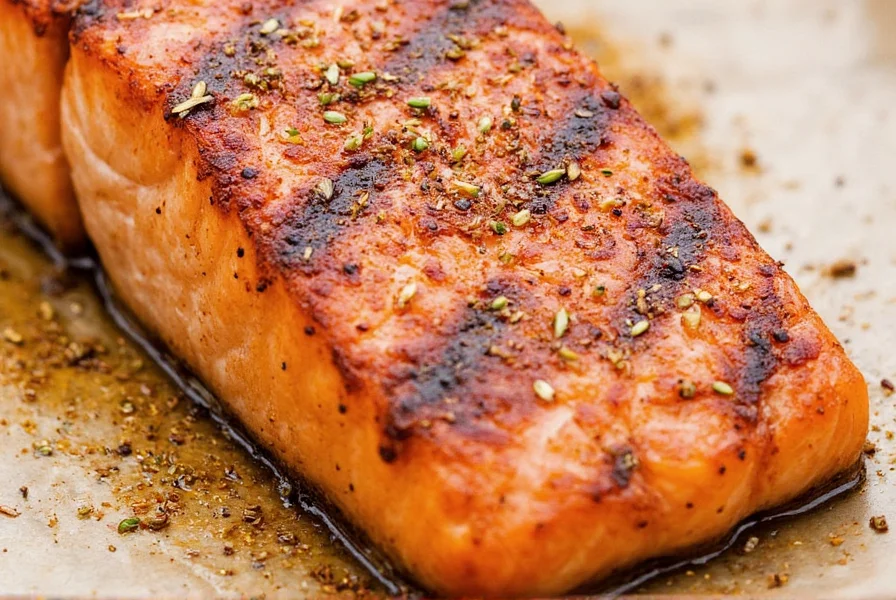
2. Herb Haven Citrus Herb Mix
A light and zesty option, this seasoning combines fresh dill, parsley, and zested lemons. Perfect for those who prefer a more delicate flavor profile, it brings a bright, refreshing note to your salmon.
- Features: Fresh herbs, citrus notes
- Advantages: Enhances natural flavor without masking it
- Use Cases: Grilling, pan-searing, baking
- Target Audience: Health-conscious eaters, casual cooks
- Suitable Occasions: Weeknight dinners, brunches
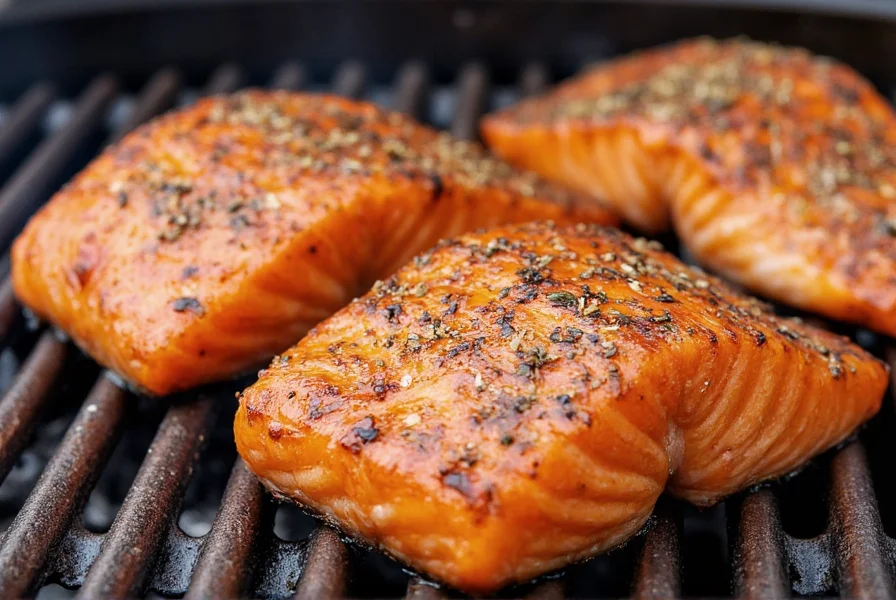
3. Spice Master Asian Fusion Seasoning
This unique blend offers a fusion of soy, ginger, and sesame, giving your salmon an exotic twist. It's a must-have for anyone who enjoys global flavors and wants to experiment with their cooking.
- Features: Soy, ginger, sesame, rice vinegar
- Advantages: Adds complexity and depth
- Use Cases: Grilling, stir-frying, marinating
- Target Audience: Foodies, international cuisine lovers
- Suitable Occasions: Special events, themed dinners
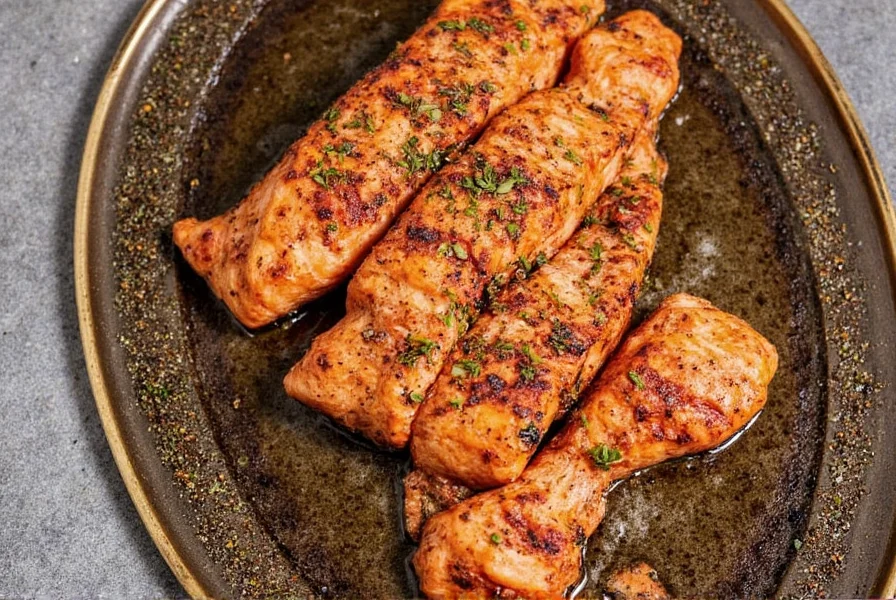
4. Bold Breeze Garlic Butter Seasoning
For those who love a rich, buttery finish, this seasoning combines garlic, butter, and herbs into one easy-to-use blend. It's perfect for creating a luxurious, melt-in-your-mouth texture that complements the flaky salmon.
- Features: Garlic, butter, herbs
- Advantages: Creates a silky, flavorful crust
- Use Cases: Grilling, baking, pan-searing
- Target Audience: Flavor seekers, gourmet chefs
- Suitable Occasions: Dinner parties, special occasions
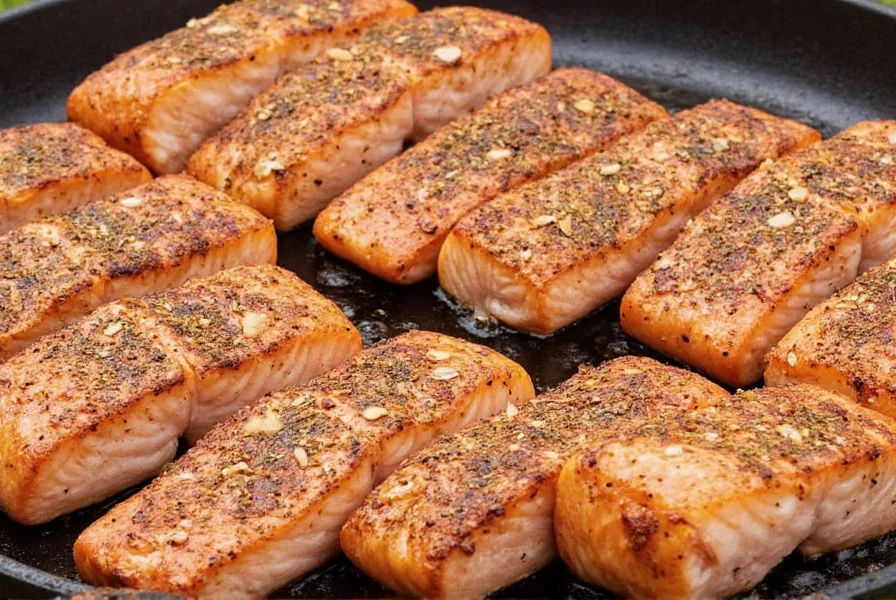
Frequently Asked Questions
How long should I marinate salmon before grilling?
For best results, marinate salmon for 30 minutes to 1 hour before grilling. Marinating longer than 2 hours, especially in acidic marinades (like those with citrus or vinegar), can start to 'cook' the fish and affect its texture. Always marinate in the refrigerator, not at room temperature.
What's the best seasoning for beginner grillers?
For beginners, we recommend starting with a simple citrus-herb blend. A mixture of olive oil, lemon zest, fresh dill, salt, and pepper is forgiving and enhances salmon's natural flavor without overwhelming it. This classic combination is hard to mess up and works well with most cooking methods.
Can I use the same seasoning for other fish?
Yes, most salmon seasonings work well with other fatty fish like trout, mackerel, and char. For leaner fish like cod or tilapia, you may want to reduce the salt content and acidic components, as these fish are more delicate and can become dry or 'over-marinated' more easily.
How do I prevent salmon from sticking to the grill?
To prevent sticking: 1) Ensure your grill is properly preheated, 2) Clean and oil the grates thoroughly before cooking, 3) Pat the salmon completely dry before seasoning and grilling, 4) Don't move the fish too soon after placing it on the grill (wait until it releases naturally), and 5) Consider using a grill basket for more delicate fillets.
What temperature should I grill salmon at?
For best results, grill salmon over medium heat (around 375-400°F). Higher heat can cause the outside to burn before the inside is cooked, while lower heat may cause the fish to dry out. The internal temperature of cooked salmon should reach 145°F at its thickest part for safe consumption.
How much seasoning should I use per pound of salmon?
As a general rule, use about 1-2 teaspoons of dry seasoning blend per pound of salmon. For wet marinades or rubs with oil, use approximately 1-2 tablespoons per pound. Always start with less—you can add more after cooking if needed—but it's difficult to remove excess seasoning once applied.
Conclusion
Mastering grill salmon seasoning is not just about following a recipe—it's about understanding how different ingredients interact and how they can transform a simple piece of fish into a culinary masterpiece. With the right seasoning, your salmon can go from ordinary to extraordinary, impressing guests and satisfying your own palate.
Whether you're experimenting with new flavor profiles or sticking to classic favorites, the key is to have fun and enjoy the process. After all, food is meant to be savored—and nothing says 'savor' like a perfectly seasoned grilled salmon.
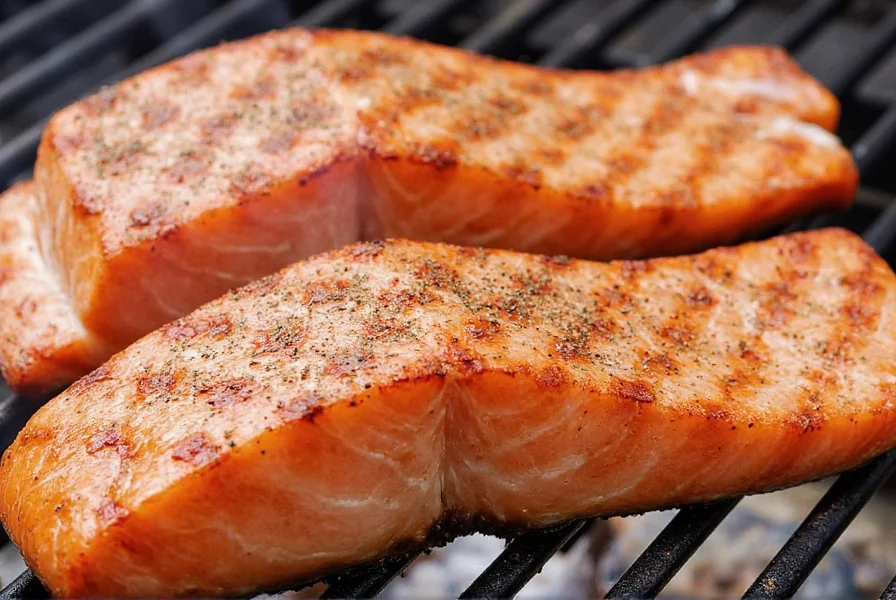

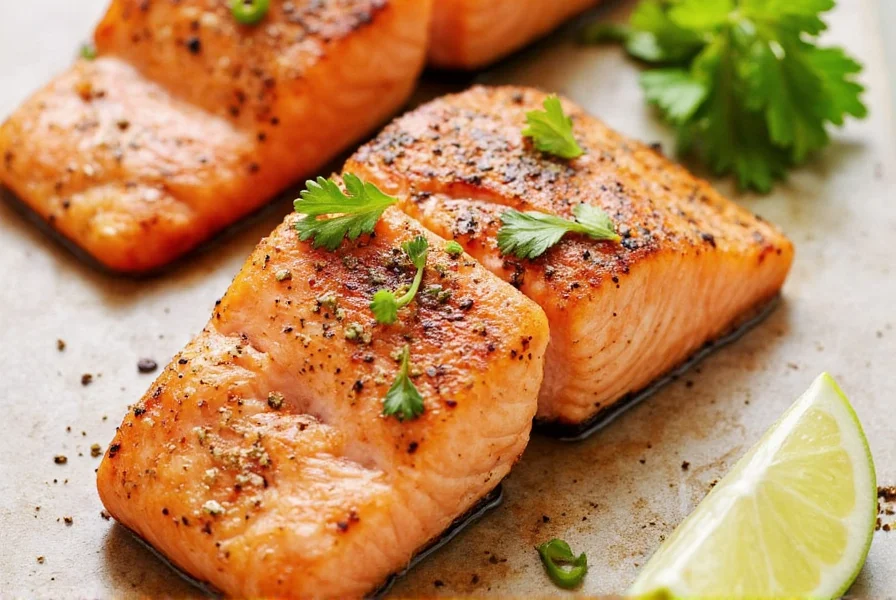









 浙公网安备
33010002000092号
浙公网安备
33010002000092号 浙B2-20120091-4
浙B2-20120091-4